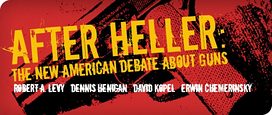Dennis Henigan’s criticism of Bob Levy leaves a little to be desired in terms of accuracy. Levy had quoted Nelson “Pete” Shields’s explanation of his plan for gradual handgun prohibition. Here’s the full quote:
“The first problem is to slow down the number of handguns being produced and sold in this country. The second problem is to get handguns registered. The final problem is to make possession of all handguns and all handgun ammunition–except for the military, police, licensed security guards, licensed sporting clubs, and licensed gun collectors–totally illegal.” (Richard Harris, “A Reporter at Large: Handguns,” New Yorker, July 26, 1976, p. 58.)
Henigan says that Levy “resorts to the old NRA warhorse of using Pete Shields’s quote from thirty-two years ago in an interview he gave before he took the leadership of the Brady Campaign’s predecessor organization, expressing a viewpoint that has never been the policy of the organization.”
According to the New Yorker’s summary of the article, “Writer talks to the N.C.C.H.’s [National Council to Control Handguns] present director, Nelson T. Shields III.” (emphasis added.) According to the Brady Campaign’s current website, Shields began working for the NCCH in 1975. Whether or not he was the director, he was clearly expressing the NCCH’s position.
In the June 1, 1987, Washington Monthly, Josh Sugarmann explained: “Founded in 1974 as the National Council to Control Handguns, HCI originally called a ban on private handgun possession the ‘most effective’ solution to reducing violent crime rapidly and was at one time a member of NCBH [National Coalition to Ban Handguns].” Sugarmann went on to castigate Handgun Control, Inc. (the group’s second name, adopted to replace “National Council to Control Handguns” and preceding the current name, “Brady Campaign to Prevent Gun Violence”) for abandoning handgun prohibition because of polling data.
So Henigan is right to say that his organization does not currently propose handgun prohibition, and has not done so for a long time. But he is wrong to say that his group never did.
In any case, Levy’s point about the current efforts of handgun prohibitionists is supportable by reference to overt handgun ban groups such as Josh Sugarmann’s Violence Policy Center, the Coalition to Stop Gun Violence (formerly named the National Coalition to Ban Handguns), and the International Action Network on Small Arms (of which the Brady Campaign is a current member).
Henigan is also correct that Bob Levy and I disagree about the certainty of Heller’s long-term staying power. I hope Bob is right, but two terms of President Obama could replace two or more of the Justices in Heller’s 5-4 majority. Not that Heller would necessarily be overruled — just construed so narrowly (and not incorporated against the states) as to pose no limit to state and local gun bans, and as to allow even federal bans if written a little more carefully than the D.C. ban.
Dennis’s claim about Chuck Michel’s alleged “gaffe” is overstated. As Michel stated, accurately, many of the current advocates of licensing and registration see these measures as steps towards confiscation — as did Pete Shields in 1976. The Brady Campaign itself supported a New York City law which used old registration lists to confiscate rifles and shotguns which had been dubbed “assault weapons” and retroactively criminalized.
Michel also said that Heller (presuming it remains strong, and is incorporated) would reduce fears that licensing and registration would lead to confiscation. He also said that some licensing systems might still be unconstitutional. (A good example would be the one in New York City, where the police often ignore the statutory requirement to make decisions on handgun licenses within six months of the application.) And he said that he was personally against licensing because “you can’t license a civil right.”
You may agree or disagree with Michel’s viewpoint, but he honestly said what he thinks, and it’s somewhat mean-spirited to claim that Michel was dissembling, or that expressing his own, internally consistent viewpoint, is a “gaffe.”
In Henigan’s view, “demonizing the gun lobby” merely requires reciting its “extremist positions.” He points to NRA support for bills to prevent corporations from firing employees who have a legal hunting rifle or a licensed handgun in the trunk of their car when it is parked in the company parking lot. I guess the difference between extremism and “sensible” gun laws is in the eye of the beholder, since some people might consider it “extremist” for the Brady Campaign to be a supporting member of an international lobby (IANSA) that wants a global ban on gun ownership for self-defense, a ban on all handguns, a ban on any rifle that can fire 100 meters (i.e., virtually all of them), claims there is no right to self-defense, that it’s an international law violation for governments to allow women to shoot rapists, and wants an international treaty that would have outlawed supplying arms to the French Resistance, the Warsaw ghetto fighters, or the American Revolutionaries.

